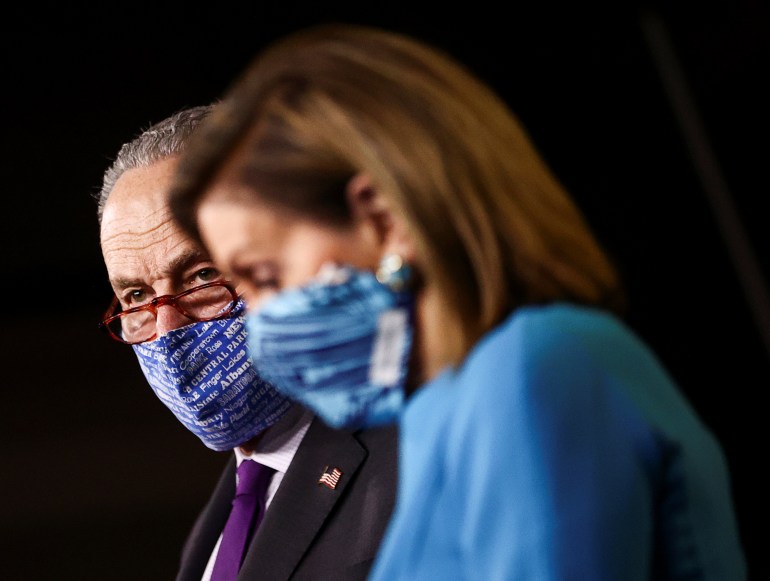‘Lame duck’ US Congress bogged down in politics over COVID bill | US & Canada
[ad_1]
With the coronavirus pandemic resurging across the United States, Congress appears no closer to reaching a deal on a new COVID-19 spending package than it was before the election.
Republicans and Democrats had been negotiating a compromise $2 trillion coronavirus aid package and there was hope a deal could be reached in a post-election “lame duck” session. That now appears less likely.
In the past, lame-duck sessions of Congress have been a time when compromises on big spending and budget items have been easier to find. President-elect Joe Biden on Monday urged Republicans to work with Democrats on a COVID-19 rescue package that can be passed before the end of the year.
But rather than removing obstacles to bipartisan compromise, the outcome of this election appears to have complicated politics on Capitol Hill.
“Instead of working to pull our country back together, so we can fight our common enemy COVID, the Republican majority is busy spreading conspiracy theories, denying reality, poisoning the well of our democracy,” Senate Minority Leader Chuck Schumer said on Monday.
 Two runoff races in Georgia in January will determine whether Chuck Schumer and the Democrats control the US Senate, making bipartisan dealmaking in a ‘lame duck’ session harder [Hannah McKay/Reuters]
Two runoff races in Georgia in January will determine whether Chuck Schumer and the Democrats control the US Senate, making bipartisan dealmaking in a ‘lame duck’ session harder [Hannah McKay/Reuters]
Outgoing Republican President Donald Trump has refused to concede the outcome of the election, falsely claiming fraud in key states. Trump is blocking Biden, who takes office on January 20, from engaging with US agencies in transition planning.
Two Republican-held US Senate seats are going to hotly contested runoffs with Democrats in Georgia, a state Biden won in the presidential election.
And there is no leadership coming from the White House where a sulking and largely silent President Trump has stuck to posting far-fetched claims on Twitter and playing golf.
Instead of negotiating with Democrats Schumer and House Speaker Nancy Pelosi, Republican Majority Leader Mitch McConnell has not spoken to either about a coronavirus bill since the election, Schumer said.
“The country deserves a bill that meets the needs of the American people,” he said in Senate floor remarks.
“We should be doing all that is necessary.”
Prior to the election, Speaker Pelosi and outgoing Treasury Secretary Steven Mnuchin had been negotiating about a $2 trillion deal for a coronavirus spending package. Senate leader McConnell said he wanted a $500bn bill.
Biden’s incoming team is backing Pelosi after she and Schumer strategised by telephone last week.
“We have her back in handling this,” Biden’s Chief of Staff-designate Ron Klain said in a television interview on Sunday on NBC.
“Our message to Speaker Pelosi is: ‘Keep doing what you’re doing to the Republicans. Let’s get this done.’ I mean, this could be a first example of bipartisan action post the election,” Klain said.
 Republican Senate Majority Leader Mitch McConnell is unwilling to bring a bill to a vote in the Senate if he knows President Trump opposes or would veto it [Erin Scott/Reuters]
Republican Senate Majority Leader Mitch McConnell is unwilling to bring a bill to a vote in the Senate if he knows President Trump opposes or would veto it [Erin Scott/Reuters]
In addition to addressing the coronavirus, Congress is also facing a budgetary deadline on December 11 to renew funding for government agencies or face a potential shutdown. Trump has not signalled what kind of bill he would sign.
Congress is working on an annual defence authorisation bill that Trump has threatened to veto because it would constrain his orders to withdraw US troops from Germany and Afghanistan.
The defence bill would also begin a process of renaming US bases and ships named after former Confederate generals, a flashpoint for Trump who opposes it.
Raising alarm on Capitol Hill, Trump fired Defense Secretary Mark Esper in a tweet and replaced the top staff at the Pentagon last week.
Meanwhile, with no movement towards political compromise, the Republican-controlled Senate is continuing to confirm more judicial nominees rather than engage in legislative work.
Senators on both sides are becoming anxious nothing will get done.
“The Senate – time and time and time again – is voting on judicial nominees that have been recommended predominantly by a special interest group,” said Senator Patrick Leahy, a Democrat.
“But we cannot do a single thing to help the average people who are suffering from COVID,” Leahy complained.
Senator Jerry Moran, a Republican, complained that local governments across the country need an extension of a federal deadline for spending relief funds provided in March.
There is bipartisan support for a measure Moran has proposed, he said. And yet, it cannot get a vote in the Senate.
“Around here it seems if we can’t do everything to solve a problem, we don’t do anything to solve a problem. I’ve never understood that approach,” Moran said in Senate floor remarks.
[ad_2]
SOURCE NEWS

